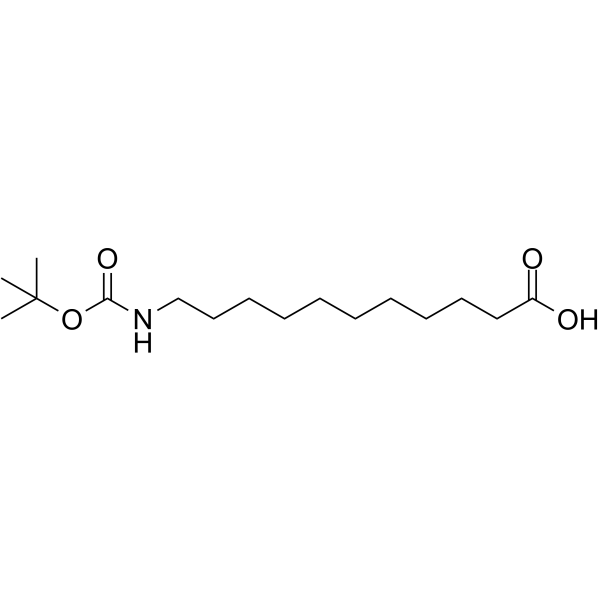
Boc-11-aminoundecanoic acid
CAS No. 10436-25-6
Boc-11-aminoundecanoic acid( —— )
Catalog No. M26913 CAS No. 10436-25-6
Boc-11-aminoundecanoic acid is an Alkyl/ether-based PROTAC linker can be used in the synthesis of MS432.
Purity : >98% (HPLC)
 COA
COA
 Datasheet
Datasheet
 HNMR
HNMR
 HPLC
HPLC
 MSDS
MSDS
 Handing Instructions
Handing Instructions
| Size | Price / USD | Stock | Quantity |
| 500MG | 26 | In Stock |


|
| 1G | Get Quote | In Stock |


|
Biological Information
-
Product NameBoc-11-aminoundecanoic acid
-
NoteResearch use only, not for human use.
-
Brief DescriptionBoc-11-aminoundecanoic acid is an Alkyl/ether-based PROTAC linker can be used in the synthesis of MS432.
-
DescriptionBoc-11-aminoundecanoic acid is an Alkyl/ether-based PROTAC linker can be used in the synthesis of MS432.(In Vitro):MS432 is a first-in-class and highly selective PD0325901-based VHL-recruiting PROTAC degrader for MEK1 and MEK2. PROTACs contain two different ligands connected by a linker; one is a ligand for an E3 ubiquitin ligase and the other is for the target protein. PROTACs exploit the intracellular ubiquitin-proteasome system to selectively degrade target proteins.
-
In VitroMS432 is a first-in-class and highly selective PD0325901-based VHL-recruiting?PROTAC?degrader for?MEK1?and?MEK2.PROTACs contain two different ligands connected by a linker; one is a ligand for an E3 ubiquitin ligase and the other is for the target protein.PROTACs exploit the intracellular ubiquitin-proteasome system to selectively degrade target proteins.
-
In Vivo——
-
Synonyms——
-
PathwayOthers
-
TargetOther Targets
-
RecptorFungal| Human Endogenous Metabolite
-
Research Area——
-
Indication——
Chemical Information
-
CAS Number10436-25-6
-
Formula Weight301.427
-
Molecular FormulaC16H31NO4
-
Purity>98% (HPLC)
-
Solubility——
-
SMILESCC(C)(C)OC(=O)NCCCCCCCCCCC(O)=O
-
Chemical Name——
Shipping & Storage Information
-
Storage(-20℃)
-
ShippingWith Ice Pack
-
Stability≥ 2 years
Reference
1.Mu W, et al. Production of 4-hydroxyphenyllactic acid by Lactobacillus sp. SK007 fermentation. J Biosci Bioeng. 2010 Apr;109(4):369-71.
molnova catalog



related products
-
Pseudolaric acid A-O...
Pseudolaric acid A-O-beta-D-glucopyranoside is a natural product with antibacterial, anticancer.
-
JK-P3
JK-P3 is a pyrazole-based inhibitor of VEGFR-2 (IC50: 7.8 μM). JK-P3 inhibits FGFR 1/3 kinase activity in vitro, but has no effect on FGFR signaling in cell-based assays.
-
Carmine
Ponceau 4R is a synthetic strawberry red azo dye that is a food colorant dye used in a variety of food products.



 Cart
Cart
 sales@molnova.com
sales@molnova.com


